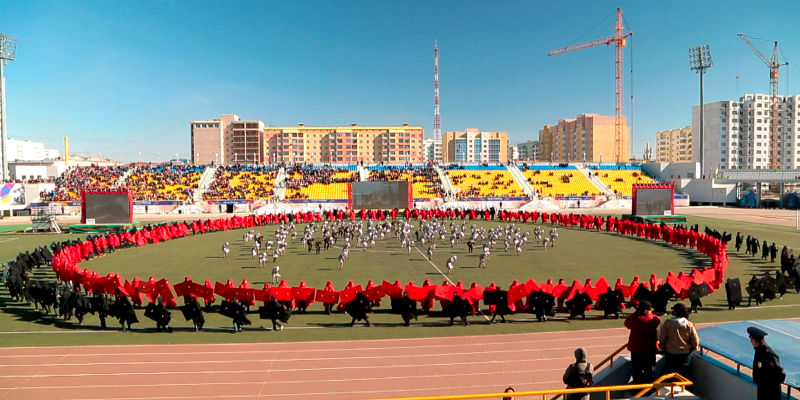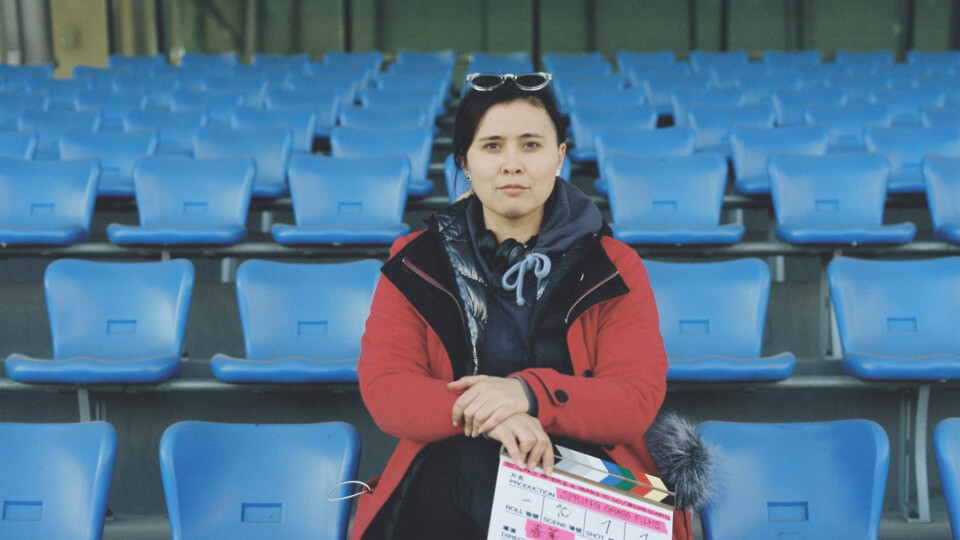Blind Gulliver
A film about a blurred vision of the world, vision correction and the misery of a traveller’s existence.
The image is of a conscious modern-day traveller wandering on the paths of sensory perceptions and memories from his expeditions to remote places vainly attempting to find a way to unite and organize them.
The movie, Blind Gulliver, is compiled out of documentary material filmed in-between the years 2013-2015 in Russia, Ukraine and the optic shop in Prague at Lužiny. The central figure of the movie is the filmmaker and explorer who is at the optic store getting his eyesight checked and corrected, in order to continue in his profession as a person travelling with his camera to faraway foreign lands.The examination and discussion with the optician regarding sight disorders, fading of vision and the general laws governing human perception of sensory phenomena serve as the film framework and it is interrupted with short and long excursions to the locations where the examined subject usually spends time on his travels. In this case, it is particularly Russia and Ukraine. The post-Soviet territory with many difficult-to-understand, and many cultural and political phenomena which are basically impossible to combine together into one movie, not to mention, the possibilities of integrating a completely private matter into the mix. The civil war in eastern Ukraine, the worries of a Moscow dispatcher of municipal services, preparations for the state celebrations of the 70th anniversary commemorating the end of the Great Patriotic War in the Siberian regional centre, a staff visit to a museum in a former Stalin camp, a meet up of Nordic reindeer herders dressed in folk apparel, the Kiev defenders at the Independence Square, neoshaman ideology alongside Russian Imperial nationalism, a party of Novosibirsk Institute graduates, a train on the Trans-Siberian Railway, the transport of a herd of Yakutian horses and a Chukotka fairytale all become something resembling a nightmare or severe hallucinations as they interconnect and interweave with one another. Through them a picture of the current Russian-Ukrainian civilization is painted and it reveals the impossibility of finding any unifying gesture or a fixed point in relation to which this travel experience could somehow be organized.

Blind Gulliver
Thanks to the fact that the film is framed by the situation at the optic store, all of these film inputs can be understood as flashbacks, flashforwards, memories, visions, dreams and reflections of the examined subject. They are somehow decrypted and illuminated by the ongoing debate with the optician offering a metaphorical (intentionally naively or ironically used) key. Furthermore, it even serves as some kind of illusory consolation: as if everything what the blind (in reality just very short-sighted, but selectively - perhaps even deliberately - truly blind to many phenomena of the world and personal problems) Gulliver perceived on his travels, perhaps, also all that he will see, can be considered to be an eye chart test. As if to say everything can be disintegrated into electromagnetic waves and thus somehow it alleviates the burden of personal obsessions, global societal trauma and the futile effort to see one purpose and one world behind all of this. A counterpoint parallel to this "rational" commentary is offered in the form of mystical interpretations, given to the travelling Czech filmmaker by Russian "wizards": a card man, interpreting Tarot arcana during the train ride, a witch, declaring the arctic region of Russia to be the brain of the planet, and a cybernetic neoshaman, trying to capture the Holy Ghost in mathematical tables. Within these interpretations lays all that is seen and heard, drawing us into the semantic field leaning on such categories as the archetype, prophecy, personal strength and magical operations. Both story lines of the author are then intertwined with specific material shot in a limited, but by no means logically bound time frame which is only slightly connected by its own internal logic. We cannot even attempt to talk of one clearly unifying theme. The only thing connecting it all (however akin to the joining of scraps giving way under pressure from the press), is a riveting moment of the actual journeying, the particular motion of the camera on various means of transportation (a plane, helicopter, train, reindeer sleigh ride, boat, car, and a motorized sleigh) suggesting Gulliver’s physical movement in the given territory. In regard to the audio folder, it means that noises of various engines enjoyed a privileged position as the fundamental source of sound dynamics.

Blind Gulliver
By the end of the film, Gulliver is prepared to continue his journey with his eyesight corrected by the optician, despite not having his life significantly changed by actually buying a new pair of glasses or contact lenses. The film, Blind Gulliver, provides us with the idea of a journey, which is inherently infinite and everlasting until it comes to a halt caused by death. The same realization also applies to the search for possible meanings which are offered, or vice versa kept secret from the hero and to those creating the movie out of the compiled material.
It is therefore a film with an essentially open structure , which in theory could be filmed and created endlessly, a film which in this respect, attempts to imitate the basic human existential position. It is a film which is incomplete, very personal, and it may be related to problematic and perhaps some dubious frames of reference. Despite of all of this, it finds its own way to speak to matters important in this world.


